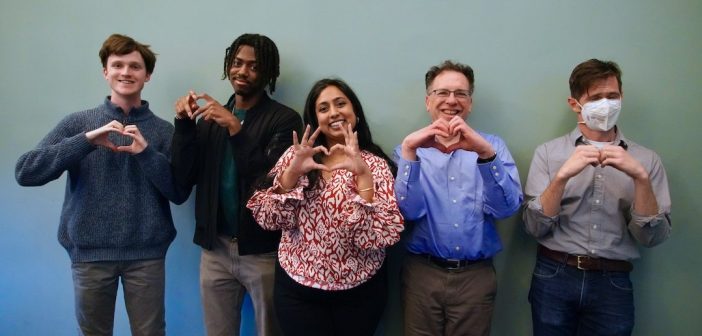The group—a professor, a psychologist, and three students—gathered in a classroom in Duane Library on Feb. 14, where they spoke to members of the Fordham community about how love appears in their professional work.
Literature on Love
Some of them shared their favorite literature on love. Thomas O’Donnell, Ph.D., associate professor of English and medieval studies, printed out three poems and passed out copies to the audience: a joyful poem written by Comtessa de Dia, a 12th-century French noblewoman; a mournful poem by Umm Khalid, an Arabic poet from the 8th or 9th century; and a funny poem by Geoffrey Chaucer, a 14th-century English poet.
“[Chaucer] says he is so in love that he feels like a piece of roasted fish in jam sauce,” O’Donnell said, to laughter from the audience.
Asher Harris, a Ph.D. student in theology, talked about American jazz musician John Coltrane, who expressed love and gratitude to God for saving him from his heroin addiction. The most open expression of this love appeared in his album A Love Supreme, particularly in the song “Psalm,” said Harris, who played a recording for the audience.
Another scholar, Christopher Supplee, FCRH ’25, a creative writing major, shared a poem he wrote and recited in honor of the event: “A World Without Love.”
“There are matters that cannot be mended by mortal hands alone,” he said to the audience, reading from his poem. “That only miracles may fix, assuming they still exist.”
Supplee said that when he was writing his poem, he was inspired by the question “What is love?”
“It made me want to sit down and think about what love means to me—what are my experiences, what I’ve read, what I’ve been taught from scholars, writers, and entertainment,” Supplee said. “Love can be expressed in many different ways, whether it be through justice, romance, or friendship.”
Queer Love at Fordham
Other scholars shared their own research on love. Benedict Reilly, a senior at Fordham College at Rose Hill who studies theology, discussed the theme of love from his book Queer Prayer at Fordham. He started the book project two years ago, interviewing LGBTQ+ members of the Fordham community about how they pray. During those conversations, he learned about the connection between prayer and love. One interviewee said that she learned to love herself through prayer. Another interviewee—an asexual and aromantic woman who longed to have a child of her own—spoke about how she found love and comfort through a Hail Mary.
“I’m sharing all of these with you because I want you to think about different prayers or songs that might be helpful to you all as you fall in love,” Reilly said.
The final invited speaker, Sarika Persaud, Ph.D., a supervising psychologist in Counseling and Psychological Services who specializes in love and relationships, spoke about what her work has taught her about love.
“When I’m sitting with a person and helping them heal, I’m not only opening them up to love as a feeling, to feel love again, but to love as who you are—to exist in the world as love,” said Persaud, who added that her Hinduism philosophy informs her work. “All of your desires, whatever relationships you enter into, whatever relationships come your way, whatever challenges come your way, they’re all opportunities … to love more.”
What Love Means to a Jesuit
After each guest spoke, event host and theology professor Brenna Moore invited the audience to reflect on what love means to them.
Among them was Timothy Perron, S.J., a Jesuit in formation and doctoral student in theology.
“As somebody who has taken a vow of celibacy, a lot of times, people think, ‘What could that person know about love, especially romantic love?’” Perron said. “But actually, I’ve thought about it a lot.”
Before he decided to become a priest, he wondered if he could commit to that vow. After much thought, he said he realized that every human has the same needs and desires, but they appear in different ways.
“I still have a need for close friendship, intimacy, love, and care for others … [but there are]all of these different ways that love could be understood,” Perron said. “If I see somebody who is looking for money or something, I’ll often stop and talk to them or take them to the nearest deli … Just stuff like that, where you feel that love and that connection … intentionally developing close relationships with people, keeping in close touch, calling them—all of those sorts of things, I think, are part of what love means.”



